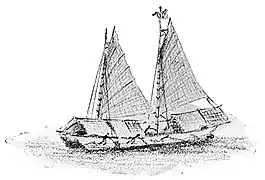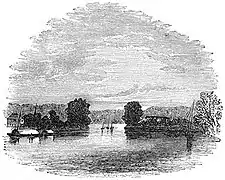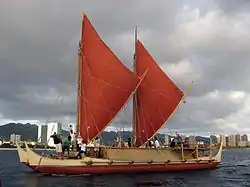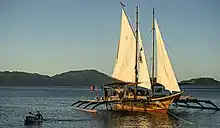Casco (barge)
Cascos are flat-bottomed square-ended barges from the Philippines. They were used mostly to carry cargo along lakes and rivers, and as lighters to transport goods to and from moored ships.[1] Though they resemble the Chinese sampan, they are much larger with two detachable masts with junk rigs made of woven fiber. They also possess outrigger-like platforms along the entire length of the sides, which is used by punters with barge poles when traversing shallow water. They were steered by an oar or a central rudder by a helmsman housed in a small raised platform at the stern. The entire deck is covered almost entirely in removable curving or pitched panels.[2][3]
Cascos were most prevalent in southern Luzon, particularly along the Pasig River and Laguna de Bay, as well as in the Manila Bay harbor.[2][3] In the late 18th and early 19th centuries, they were often strung together in a train drawn by a steamship (vapor). They were used as transport ships by American troops in Laguna de Bay during the Philippine–American War.[4] Cascos are still used today in fluvial parades. An example is during the celebrations of Our Lady of Peñafrancia in Naga City, Bicol.[5] [6]
.jpg.webp) Casco (foreground) in Manila (c. 1900)
Casco (foreground) in Manila (c. 1900) Drawing of a casco (c. 1906)
Drawing of a casco (c. 1906)_in_Manila_Bay_(1906).jpg.webp) A casco in Manila Bay in full sail (c. 1906)
A casco in Manila Bay in full sail (c. 1906) An 1855 woodcut with a casco (left) in a woodcut on the entrance to the Pasig River from the Manila Bay
An 1855 woodcut with a casco (left) in a woodcut on the entrance to the Pasig River from the Manila Bay._Nach_der_Zeichnung_eines_Tagalen.png.webp) A casco with two punters (1873)
A casco with two punters (1873).png.webp) Vista del Puente de Manila, an 1847 painting by José Honorato Lozano showing a casco (center left) and several sampans and other river boats
Vista del Puente de Manila, an 1847 painting by José Honorato Lozano showing a casco (center left) and several sampans and other river boats
See also
| Wikimedia Commons has media related to Casco. |
References
- Ricardo E. Galang (1941). "Types of Watercraft in the Philippines". The Philippine Journal of Science. 75 (3): 291–306.
- John Foreman (1906). The Philippine Islands: A Political, Geographical, Ethnographical, Social and Commercial History of the Philippine Archipelago embracing the Whole Period of Spanish Rule with an Account of the Succeeding American Insular Government. Hazell, Watson and Viney, LD.
- Campbell Dauncey (1906). An Englishwoman in the Philippines. E.P. Dutton & Company.
- Arnaldo Dumindin (2006). "Philippine–American War, 1899-1902". Retrieved 1 July 2018.
- Insight Guides Philippines. Rough Guides UK. 2018. ISBN 9781786718563.
- Jagor, Fedor (1873). Reisen in den Philippinen. Berlin: Weidmannsche Buchhandlung.



.jpg.webp)